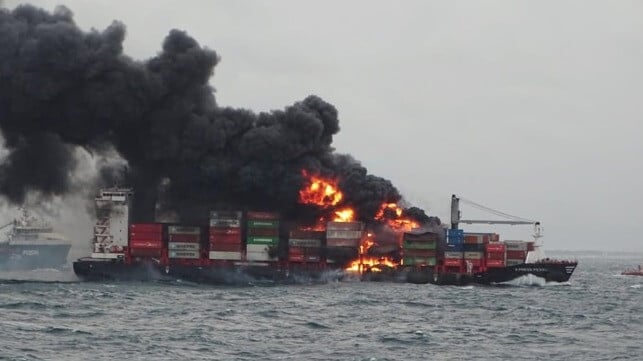New VDR Transcript Sheds Light on Xpress Pearl Disaster

The BBC World Service has obtained a previously unreported VDR transcript of what may be a series of conversations between the master of the burned-out container feeder XPress Pearl and shoreside managers. The document was filed by Sri Lanka's government in a case before Colombo's Supreme Court; the shipowner disputes the document's accuracy and completeness, and is contesting it in court proceedings.
The BBC's report appears to confirm initial accounts of a slow-rolling catastrophe that began long before XPress Pearl reached Sri Lanka in May 2021. It provides new details of the crew's attempts to respond to a leaking container of nitric acid, and the Russian master's growing frustration with the lack of a solution.
"About one liter an hour [leak rate from the container]. Remain the same. We're washing deck continuously by fire pump, seawater, because main deck too much corrosion . . . very strong chemical, very strong chemical," Russian master Vitaly Tyutkalo said. "If you will read my email, I sent to everybody, right, already three days fire pump running. But leakage remain on deck and maybe more and more corrosion."
After the call with the home office, he complained to a crewmember on the bridge that "they don't take any action, don't give me any advice," and claimed that company officials wouldn't take responsibility, the VDR transcript suggests.
Port officials at Hamad, Qatar and Hazira, India refused to provide a port-of-refuge service to unload the leaking boxes from Xpress Pearl, so the container ship sailed onwards to Colombo, Sri Lanka, a voyage of some 1,000 nautical miles southeast from Hazira. After arrival off Colombo, a container on deck caught fire, but local authorities refused to allow XPress Pearl to berth for firefighting operations. It burned and sank, releasing acids, caustic soda, 9,700 tonnes of epoxy resin and 1,680 tonnes of plastic pellets into the water (minus any amounts consumed by the fire). It is believed to be the largest plastic spill in history.
The master faces criminal charges in connection with the disaster and remained in Sri Lanka at least as recently as last year, free to live on the island but unable to leave until court proceedings have finished.
